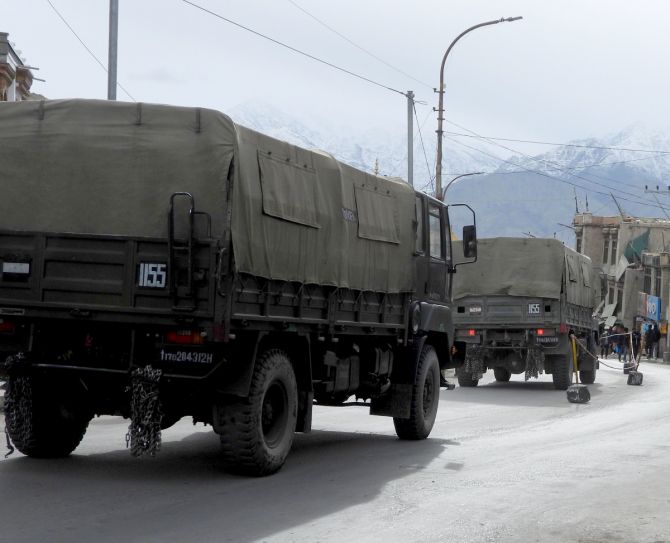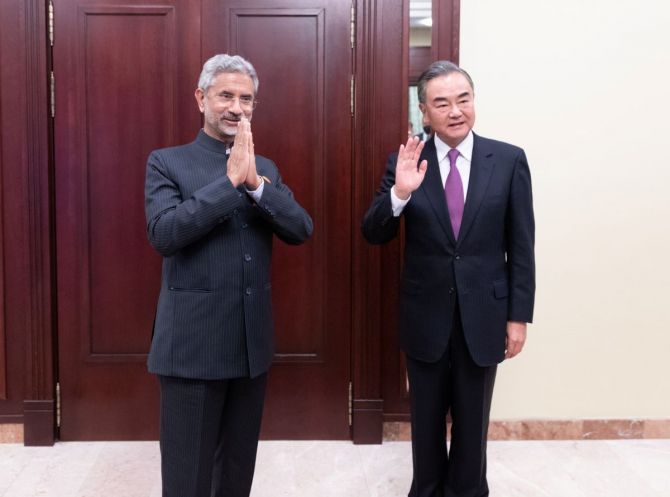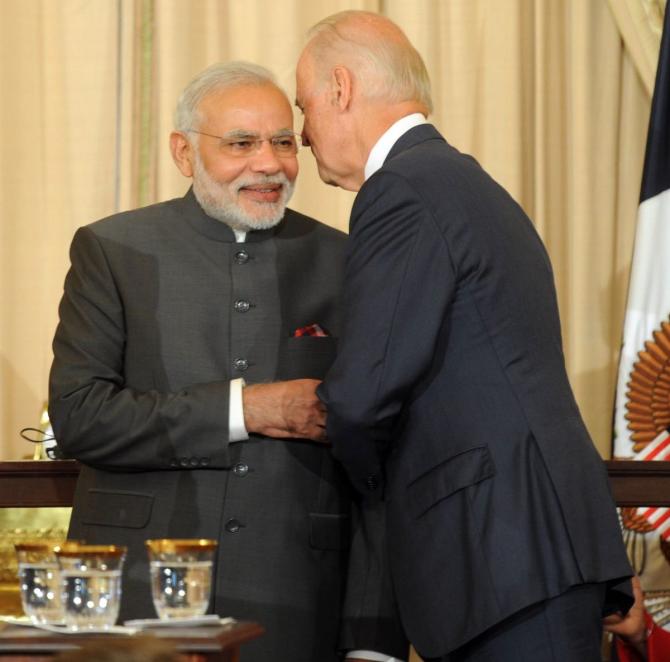China is in no hurry to disengage at the border and the region and international community is moving on.
The spectre of a long haul in Ladakh haunts India, points out Ambassador M K Bhadrakumar.

Two Indian correspondents based in Beijing drew out the Chinese foreign ministry spokesperson Hua Chunying at a press briefing on Thursday on External Affairs Minister S Jaishankar's recent 'frank' remarks about India's problematic relationship with China in an interview with the Australian think-tank Lowy Institute. A purpose was served.
Hua Chunying's comments (external link) touched three templates.
One, India must shoulder the blame for having precipitated the current situation; two, China does not propose to use force to change the ground situation in eastern Ladakh but remains resolute about safeguarding its territorial integrity; and, three, India should work with China rather than against China, which will be to mutual benefit, by adhering to the consensus reached between President Xi Jinping and Prime Minister Narendra Modi and work towards enhancing political mutual trust and strengthening practical cooperation.
To be sure, the external environment prompted Jaishankar's decision to switch to megaphone diplomacy.
The Indian establishment is recovering from Donald Trump's shock defeat in the US presidential election.
The incoming Joe Biden administration is unlikely to view India as a 'counterweight' to China.
The efficacy of the entire foreign policy line that Jaishankar pursued -- shepherding India into an alliance with the US -- has become questionable.
The muscular line on China is yet to bring dividends and may be proving counterproductive, but a U-turn will be a loss of face.
China is in no hurry to disengage at the border and the region and international community is moving on.
The spectre of a long haul in Ladakh haunts India.
China's focus is turning toward engagement with the Biden administration. During the past week alone, top Chinese officials took the stage thrice to affirm Beijing's interest to resume dialogue with the US, bring the relations back on track, and 'rebuild mutual trust for the next stage of bilateral ties'.

State Councilor and Foreign Minister Wang Yi spoke on these lines at a virtual meeting (external link) with a delegation of the board of directors of the US-China Business Council on December 7 and at a symposium in Beijing (external link) four days later on the international situation and China's diplomacy in 2020.
Again, on December 11, in an extraordinary gesture, Wang Chen, vice chairman of the National People's Congress Standing Committee and a member of the Politburo of the Chinese Communist Party Central Committee, attended an event (external link) held by the American Chamber of Commerce in China in Beijing to underscore the high importance Beijing attaches to the resumption of dialogue with the US.
This was highly symbolic insofar as Wang is among 14 officials from China's top legislature who have been put under sanctions by the Trump administration recently over the Hong Kong issue.
Biden is expected to abandon the 'America First' approach and instead work in concert with the US' European allies. But forging transatlantic cooperation and coordination poses challenges.
The German leadership becomes vital here, but its true potential for EU-US cooperation on China may only become clear when Angela Merkel's successor appears on the arena through the second half of 2021.
At any rate, the fault lines in the transatlantic partnership emerging during the past four years of the Trump presidency are deep and Europe is bound to agonise over the consistency of US policies beyond Biden.
The crux of the matter is that the economic consequences of the coronavirus pandemic will continue to shape the diversity of European countries' relations with the US and China.
In Asia too, a comparable situation prevails with the ASEAN countries showing aversion to taking sides between the US and China.
Having said that, the incoming Biden administration has a pressing need to engage China. Biden's choice of John Kerry as his envoy on climate change and Katherine Tai as his nominee for US trade representative signal a lighter touch with China, even while still pushing for structural change in the relationship.
Both are very strategic thinkers. They possess a sophisticated understanding of the real challenges posed by China.
There is a conundrum. As the US and China commence engagement on a variety of top-priority issues -- ranging from pandemic, trade and economic issues, climate change to Iran nuclear issue and North Korea -- India's standoff with China gets relegated to the back burner in the geopolitics of Asia.
Biden may not attribute to the Quad any undue importance simply for the sake of annoying China. India on the whole is not a priority relationship for the US either.

On the other hand, China, after concluding the RCEP, the world's largest free trade agreement, with 14 other Asian-Pacific countries last month, is speeding up its negotiations over a bilateral investment treaty (with the EU, which can be a game changer.
For India too, China is the trade and investment partner that can really boost its economic transformation.
In the final analysis, strengthening economic ties with China can help India integrate better with the Asian industrial chain.
All in all, a rethink is needed on how to 'stand up' to China -- if we must.
India has made itself extremely vulnerable by choosing an abrasive course eagerly flaunting muscularity, unlike Vietnam or even Japan, which have been walking a similar tightrope.
The excessive zeal to atrophy economic ties with China brought no advantages to our country and can only be seen as too much over the top behaviour.
The risks involved in not only irritating but offending China should have been carefully weighed taking into account India's economic vulnerability and its limitations as a middleweight with an economy less than one-fifth that of China.
India's overreach doesn't impress anyone, while its ability to play a creative, energetic leadership role in the Asian region gets adversely affected.
There is insufficient recognition among our ruling elites that there is not a lot of downside for China in getting stuck into India.
Fortunately, with some real navigational care, India avoided crossing China's red lines over Xinjiang, Hong Kong, and Taiwan.
However, taking a negative position on anything to do with China often blinds us to the legitimacy and inevitability of some of China's international aspirations, its initiatives to buy strategic space for itself (Belt and Road Initiative), China's growing military capacity to protect its economic lifelines, and its aspirations to carve out influence in global policy-making consonant with its new strength.
China is not the first country in history where a dramatically rising, hugely trade-dependent regional superpower begins to to flap its wings and reassert its historical greatness after more than a century of suppression. To construe this as 'expansionism' shows petulance and a zero-sum mindset.
The single biggest lesson India can draw from Biden's search for cooperation with China on climate change will be that with sincerity of purpose, it is possible to find issues on which there is genuine common ground to work with China.
Alas, India failed to respond to China's repeated overtures to jointly respond to pandemics. When a relationship is under strain, the smart thing to do should be to focus hard on potential shared interests that could unite rather than further divide.
Suffice to say, there is a middle way between subservience and hostility. The forthcoming US-China reset will hold important lessons for India in acting more maturely than has been the norm during the life of this government.
There is imperative need to preserve independent national judgment and take actions consistent with it.
Ambassador M K Bhadrakumar served the Indian Foreign Service for more than 29 years.
Feature Presentation: Rajesh Alva/Rediff.com










